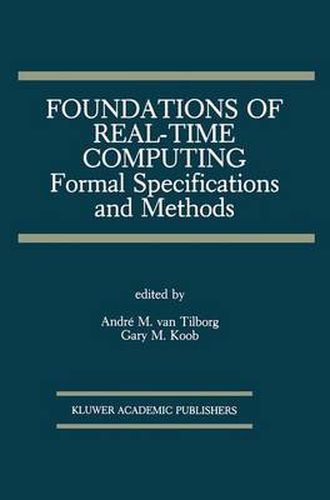Readings Newsletter
Become a Readings Member to make your shopping experience even easier.
Sign in or sign up for free!
You’re not far away from qualifying for FREE standard shipping within Australia
You’ve qualified for FREE standard shipping within Australia
The cart is loading…






This title is printed to order. This book may have been self-published. If so, we cannot guarantee the quality of the content. In the main most books will have gone through the editing process however some may not. We therefore suggest that you be aware of this before ordering this book. If in doubt check either the author or publisher’s details as we are unable to accept any returns unless they are faulty. Please contact us if you have any questions.
This volume contains a selection of papers that focus on the state-of the-art in formal specification and verification of real-time computing systems. Preliminary versions of these papers were presented at a workshop on the foundations of real-time computing sponsored by the Office of Naval Research in October, 1990 in Washington, D. C. A companion volume by the title Foundations of Real-Time Computing: Scheduling and Resource Management complements this hook by addressing many of the recently devised techniques and approaches for scheduling tasks and managing resources in real-time systems. Together, these two texts provide a comprehensive snapshot of current insights into the process of designing and building real time computing systems on a scientific basis. The notion of real-time system has alternative interpretations, not all of which are intended usages in this collection of papers. Different communities of researchers variously use the term real-time to refer to either very fast computing, or immediate on-line data acquisition, or deadline-driven computing. This text is concerned with the formal specification and verification of computer software and systems whose correct performance is dependent on carefully orchestrated interactions with time, e. g. , meeting deadlines and synchronizing with clocks. Such systems have been enabled for a rapidly increasing set of diverse end-uses by the unremitting advances in computing power per constant-dollar cost and per constant-unit-volume of space. End use applications of real-time computers span a spectrum that includes transportation systems, robotics and manufacturing, aerospace and defense, industrial process control, and telecommunications.
$9.00 standard shipping within Australia
FREE standard shipping within Australia for orders over $100.00
Express & International shipping calculated at checkout
This title is printed to order. This book may have been self-published. If so, we cannot guarantee the quality of the content. In the main most books will have gone through the editing process however some may not. We therefore suggest that you be aware of this before ordering this book. If in doubt check either the author or publisher’s details as we are unable to accept any returns unless they are faulty. Please contact us if you have any questions.
This volume contains a selection of papers that focus on the state-of the-art in formal specification and verification of real-time computing systems. Preliminary versions of these papers were presented at a workshop on the foundations of real-time computing sponsored by the Office of Naval Research in October, 1990 in Washington, D. C. A companion volume by the title Foundations of Real-Time Computing: Scheduling and Resource Management complements this hook by addressing many of the recently devised techniques and approaches for scheduling tasks and managing resources in real-time systems. Together, these two texts provide a comprehensive snapshot of current insights into the process of designing and building real time computing systems on a scientific basis. The notion of real-time system has alternative interpretations, not all of which are intended usages in this collection of papers. Different communities of researchers variously use the term real-time to refer to either very fast computing, or immediate on-line data acquisition, or deadline-driven computing. This text is concerned with the formal specification and verification of computer software and systems whose correct performance is dependent on carefully orchestrated interactions with time, e. g. , meeting deadlines and synchronizing with clocks. Such systems have been enabled for a rapidly increasing set of diverse end-uses by the unremitting advances in computing power per constant-dollar cost and per constant-unit-volume of space. End use applications of real-time computers span a spectrum that includes transportation systems, robotics and manufacturing, aerospace and defense, industrial process control, and telecommunications.